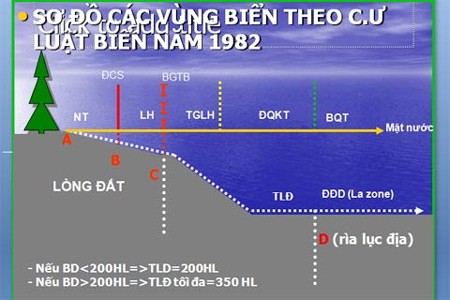(VOVworld) - This year, the United Nations and its members will mark the 30th anniversary of the UN Convention on the Law of the Sea, UNCLOS. Since 1982, the treaty has been constantly updated to meet practical needs. It is the global charter that deals with the increasing number of disputes amongst countries who are desperate to explore for more of the seas hidden natural resources. Since Vietnam became a signatory to the treaty, it has been consistent in respecting and conforming to the convention’s spirit during the settlement of conflicts over maritime territory. VOV's Anh Huyen comments:
The UN Convention on the Law of the Sea, UNCLOS, includes 320 clauses and 9 annexes that comprehensively define the legal status of territorial waters and the sovereign rights of coastal nations on international territorial waters and the seabed. The treaty also regulates a series of international mechanisms that relate to activities on the seabed and on the oceans, including the International Tribunal for the Law of the Sea, the International Seabed Authority, and the Commission on the Limits of the Continental Shelf. The Convention asks all member nations to resolve any conflicts relating to either explanations or application of the document via peaceful means, according to the UN Charter. To date, 162 countries and territories around the world have signed up.
With its long coastline, Vietnam’s National Assembly approved signing the treaty on June 23rd, 1964, as soon as it was adopted. Le Hoai Trung, Deputy Foreign Minister and Head of Vietnam’s Permanent Representative Mission to the UN, says '
The UN is a global forum that embraces almost every nation in the world and its activities influence all aspects of international life and that of every country. The UN is the key forum that will help Vietnam to deal with conflicts in a peaceful manner. That is the spirit that Vietnam is pursuing'.
 |
| Delimitation of marine areas, territorial waters, and continental shelf in accordance with Convention on the Law of the Sea 1982. (Photo: Internet) |
Over the past 18 years, as a signatory to the convention, Vietnam has actively taken part in numerous international mechanisms. The country was also selected to be Vice President of the General Assembly of the International Seabeds Authority and a member of the body’s council. In other related forums, Vietnam always states that any activities relating to the use of maritime natural resources, must abide by the regulations and fully incorporate the rights and responsibilities set out by the Convention. It has reiterated that as a country on the East Sea, Vietnam has explored for natural resources within its own sovereign waters for national construction and development. At the same time, it has complied with the Convention’s regulations, and respected the sovereignty of other countries. In return, it asks others to follow suit. Vietnam has resolutely complained at every level against the serious violations of its maritime sovereignty over its continental shelf and exclusive economic zones.
Based on UNCLOS 1982’s regulations, Vietnam agreed with some of its neighbors to settle conflicts over exclusive economic zones and overlapping continental shelf. In 1997, Vietnam and Thailand signed an agreement to abolish the exclusive economic zones and continental shelves in the Gulf of Thailand. In 2000, Vietnam and China signed a deal to set both their territorial waters, exclusive economic zones, and continental shelves in the Tonkin Gulf. In 2003, Vietnam and Indonesia did the same over their continental shelf in the south of the East Sea. These agreements have now been archived at the UN, according to Ambassador Trung 'Vietnam has clarified its views and its efforts to work with others to abide by international laws when dealing with disputes, and delimiting territorial waters and overlapping maritime boundaries. This proves Vietnam’s policy of goodwill and its seriousness about implementing the UN Convention on the Law of the Sea and other maritime agreements. Vietnam hopes all nations will resolve their pending differences peacefully and in accordance with international laws'.